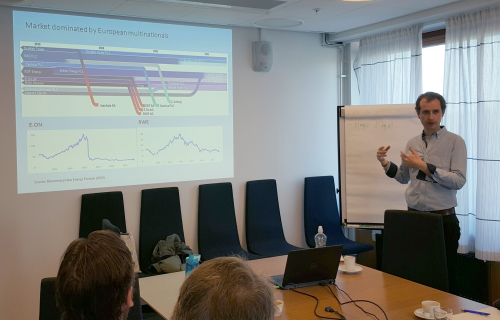 - We are no longer in an age of certainty characterized by energy policy paradigms such as market versus state, but rather, we are in a new hybrid phase of ‘inter-paradigm borrowing’ and uncertainty”, said Ronan Bolton. Photo: Allan D. Andersen.
- We are no longer in an age of certainty characterized by energy policy paradigms such as market versus state, but rather, we are in a new hybrid phase of ‘inter-paradigm borrowing’ and uncertainty”, said Ronan Bolton. Photo: Allan D. Andersen.
Energy liberalization
Since the 1980s, many countries have had reforms in their electricity sectors, which have been marked by an unbundling of the value chain. This entails that parts of the value chain are opened up for competition. In Norway, the Energy Act of 1991 was the starting point for such changes, whereby generation and trading were opened up for competition. Though Norway was an early adopter of liberalization of the electricity sector, these changes took place even earlier in the UK. Beginning in the late 1980s, the UK saw the privatization and vertical de-integration of its electricity system. This came to be known as the “British Model” of energy liberalization.
Questioning the market
Economic models and ideas stressing free markets and competition have been dominant for the last few decades, and have influenced the organization of a variety of sectors. However, Bolton pointed out that we are now witnessing something new in the UK as far as energy is concerned: “We are seeing the effects of the so-called energy ‘trilemma’ – the trilemma referring to worries over carbon emissions, security of energy supply, and rising energy prices. Many are questioning the market’s ability to deliver when it comes to these important issues, and we are seeing the emergence of a low carbon investment logic”.
Neither market nor state – but a hybrid
Bolton emphasized how government initiatives such as the Contract for Difference (CFD) for renewable energy and the UK Green Investment Bank are indicative of a new type of scenario where the UK Government is setting long-term energy targets and increasingly directing system change. The Government is reconfiguring the market to promote low carbon investment by moving towards technology specific support and by addressing investment risk. “We are no longer in an age of certainty characterized by energy policy paradigms such as market versus state, but rather, we are in a new hybrid phase of ‘inter-paradigm borrowing’ and uncertainty”, said Bolton. “We consequently need to investigate in more depth the dynamics of socio-technical regimes and their capacity to adapt through coordinated and managed innovation processes.”